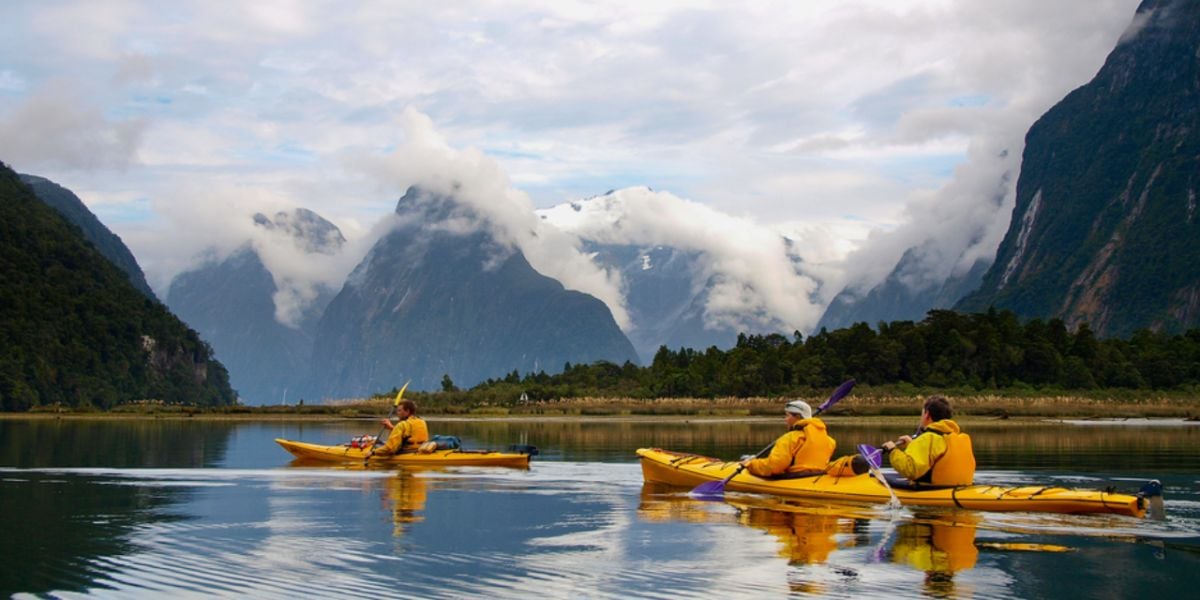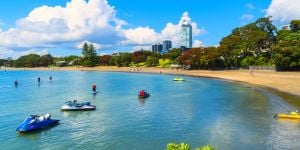
More and more tourists and expats are heading to New Zealand every year, thanks to its natural beauty and opportunities for world-class outdoor adventures. From the North Island's central plateau and volcanoes to the South Island's Alps and glaciers, there are countless breathtaking landscapes to be explored. The country is also home to flora and fauna that you won't find anywhere else in the world, and a unique cultural background, thanks to the country's combined European and Maori cultural influences.
When living and traveling in New Zealand, you may find that more emphasis is placed on outdoors and adventure activities compared with cultural pastimes, such as visiting museums or heritage sites – although there are, of course, a range of things be enjoyed for those who don't fit into the adrenaline junky category.
Outdoor pursuits in New Zealand
Hiking
Thanks to the terrain in New Zealand, hiking (or tramping, as the locals call it) is a popular activity for both New Zealanders and tourists. Hikes range from easy day hikes to rigorous multi-day tramps through national parks. New Zealand is home to a huge network of trails and routes, which you can find out about on the Department of Conservation (DOC) website. Unlike many other countries, New Zealand also has an extensive collection of remote huts for trampers to stay in – these often have mattresses, fireplaces and running water. Some of them are bookable online, and others are occupied on a first-come-first-served basis.
Mountain biking and cycle touring
Mountain biking and cycle touring are both popular activities in New Zealand. The country has a network of trails and paths that are ideal for these activities, including the Alps to Ocean Cycle Trail, the Otago Central Rail Trail, the Great Taste Trail and the West Coast Wilderness Trail. New Zealand is also home to a huge amount mountain bike parks and trails, including the Whakarewarewa Forest in Rotorua and the Queenstown Bike Park. Many people visit New Zealand specifically to participate in these activities, and there is a range of tour operators and rental companies that cater to them, so accessing trailheads and bikes can be very simple.
Hunting and fishing
If you're someone who enjoys hunting or fishing, New Zealand is known as a world-class destination for sportsmen. Exciting trout fishing takes place in New Zealand's clear, swift rivers, pig, tahr and deer hunting is popular, and the coastlines provide ample access to the many tasty saltwater species. Be sure to check which licenses are needed and what restrictions may be in place if you do wish to hunt or fish, as there are seasonal restrictions on certain species and specific licenses required.
Beaches and watersports
Thanks to New Zealand's 15,000km of coastline, there are plenty of beaches and small islands to discover. Spending time at the beach is a big part of the New Zealand summer, and you'll spot many cars and trucks heading off with surfboards, kayaks, and boats in tow. Going to the beach just to sunbathe and swim is also incredibly popular; just make sure you're prepared for New Zealand's high UV index.
If you are based in Auckland, spend some time in the eastern bays (Kohimarama, St. Heliers) or the west coast's black sand beaches, like Piha. A few hours away is the Coromandel Peninsula, home to the famous Cathedral Cove and Hot Water Beach. Travel north from Auckland, and you will find the Bay of Islands, and even further north is 90-Mile Beach.
Hamilton is only a half-hour drive away from the surf beach Raglan, and Wellington has Oriental Bay within walking distance from the city center.
The South Island has golden sand beaches in Abel Tasman National Park, wild surf beaches down the West Coast and impressive geological forms like the Punakaiki Pancake Rocks and the Moeraki Boulders. New Zealand's third island is Stewart Island.
Sea kayaking, surfing, diving, paddle boarding, windsurfing and other watersports are all popular in New Zealand, and gear to rent or purchase is readily available.
High adrenaline activities in New Zealand
New Zealand is known as the adventure capital of the world and the home of the world's first commercial bungee jump. Jet boats and zorbing were also invented in New Zealand, so it would be rude not to try them when you visit! Skydiving is also a popular activity in New Zealand, and there are spots all over the country where you can jump. In the winter, Kiwis (and tourists) love heading to the slopes and skiing/snowboarding.
Mountaineering, bouldering, rock climbing, canyoning and caving are other popular activities in New Zealand. Tourists can easily access guided trips, and many regions will have alpine clubs and other organizations that can introduce you to these pursuits.
Culture in New Zealand
Māori history
New Zealand's pre-existing Māori population was colonized by Europeans in the 1800s. Like many colonial countries, New Zealand's history involves the oppression of its indigenous population. The focus of many debates and discussions around New Zealand's history is the Treaty of Waitangi, a document that was signed in 1840 between the British Crown and over 500 Māori chiefs in New Zealand. It established a partnership between the two parties and recognized Māori as the rightful owners of their lands and other resources. Today, the treaty is the subject of ongoing debate and controversy, as many believe that it has not been fully honored by the government and that Māori rights and interests have not been fully protected. The treaty is also the subject of legal cases in which Māori are seeking to have their rights and interests recognized and protected under the terms of the treaty.
There are many Māori historical sites in New Zealand that can be visited to learn about the country's rich Māori history and culture, including the Waitangi Treaty Grounds and Te Puia, a Māori cultural center in Rotorua, where visitors can learn about Māori history, culture, and traditions.
Arts and entertainment
New Zealand has a thriving art, music and entertainment culture. This is particularly apparent in the cities where there are numerous galleries, venues, museums, and festivals to attend. In smaller or more rural centers, there are, understandably, far fewer entertainment options, although many rural areas have artisans and artists who operate small galleries or roadside shops. In terms of music, there will usually be local open mic or music nights to get involved with, even if you find yourself outside of the big cities.
New Zealand's heritage buildings and historic sites
New Zealand is a comparatively young country. Because of this, you won't find a lot of hundred-year-old buildings or old stone cathedrals to visit. Cities across New Zealand tend to be modern in appearance, with a few older buildings peppered in between. However, if you are interested in architecture, there are some architecturally notable buildings in New Zealand as well as some important heritage sites. A great way to find out about notable buildings in visiting New Zealand's heritage registry, which allows you to discover notable sites in your area.
In the North Island, Napier is known for being architecturally significant. The city was almost completely destroyed in 1931 due to an earthquake and was then rebuilt with a heavy art deco influence, making it a popular tourist destination. In the South Island, Arrowtown is famous for the preservation of historic buildings from the gold rush era. Many other towns in New Zealand will retain a heritage precinct where examples of colonial buildings can be seen.
In terms of Maori history, some of the best preserved pre-European sites are pā, fortified settlements that were built by the Māori both prior to colonization and during the New Zealand wars. They were typically located on hilltops or other strategic locations and were used for defense and protection. There are many historical pā sites throughout New Zealand that can be visited to learn about Māori history and culture.
Food and drink
New Zealand is known for its delicious food and drink, and visiting breweries or artisanal producers is a popular leisure activity in the country. There are many boutique food and drink producers in New Zealand, including winemakers, brewers, cheese makers, honey producers, and many more. Whether you want to bike among wineries, sample beer at one of New Zealand's craft breweries, or attend a cheesemaking workshop, both cities and rural areas have plentiful options for the gourmand. In terms of cafes, coffee shops, pubs, restaurants and bars, New Zealand has lots of options - especially in the cities – with the claim often being made that Wellington has more eateries per capita than New York! Find out more in our article Eating out in Auckland.
We do our best to provide accurate and up to date information. However, if you have noticed any inaccuracies in this article, please let us know in the comments section below.








